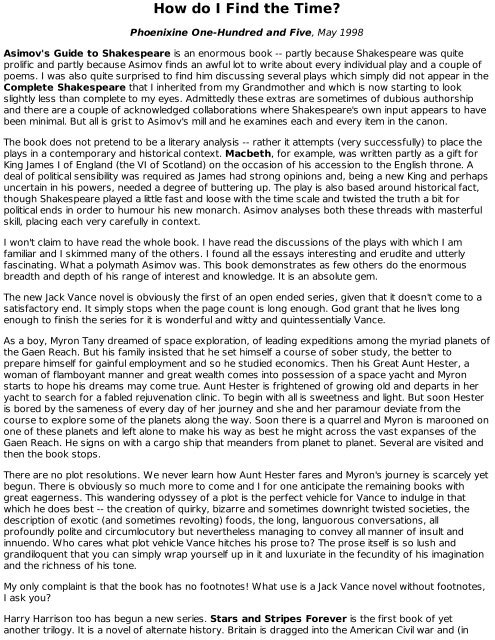Triffids Beard 2 - The Bearded Triffid
Triffids Beard 2 - The Bearded Triffid
Triffids Beard 2 - The Bearded Triffid
Create successful ePaper yourself
Turn your PDF publications into a flip-book with our unique Google optimized e-Paper software.
How do I Find the Time?<br />
Phoenixine One-Hundred and Five, May 1998<br />
Asimov's Guide to Shakespeare is an enormous book -- partly because Shakespeare was quite<br />
prolific and partly because Asimov finds an awful lot to write about every individual play and a couple of<br />
poems. I was also quite surprised to find him discussing several plays which simply did not appear in the<br />
Complete Shakespeare that I inherited from my Grandmother and which is now starting to look<br />
slightly less than complete to my eyes. Admittedly these extras are sometimes of dubious authorship<br />
and there are a couple of acknowledged collaborations where Shakespeare's own input appears to have<br />
been minimal. But all is grist to Asimov's mill and he examines each and every item in the canon.<br />
<strong>The</strong> book does not pretend to be a literary analysis -- rather it attempts (very successfully) to place the<br />
plays in a contemporary and historical context. Macbeth, for example, was written partly as a gift for<br />
King James I of England (the VI of Scotland) on the occasion of his accession to the English throne. A<br />
deal of political sensibility was required as James had strong opinions and, being a new King and perhaps<br />
uncertain in his powers, needed a degree of buttering up. <strong>The</strong> play is also based around historical fact,<br />
though Shakespeare played a little fast and loose with the time scale and twisted the truth a bit for<br />
political ends in order to humour his new monarch. Asimov analyses both these threads with masterful<br />
skill, placing each very carefully in context.<br />
I won't claim to have read the whole book. I have read the discussions of the plays with which I am<br />
familiar and I skimmed many of the others. I found all the essays interesting and erudite and utterly<br />
fascinating. What a polymath Asimov was. This book demonstrates as few others do the enormous<br />
breadth and depth of his range of interest and knowledge. It is an absolute gem.<br />
<strong>The</strong> new Jack Vance novel is obviously the first of an open ended series, given that it doesn't come to a<br />
satisfactory end. It simply stops when the page count is long enough. God grant that he lives long<br />
enough to finish the series for it is wonderful and witty and quintessentially Vance.<br />
As a boy, Myron Tany dreamed of space exploration, of leading expeditions among the myriad planets of<br />
the Gaen Reach. But his family insisted that he set himself a course of sober study, the better to<br />
prepare himself for gainful employment and so he studied economics. <strong>The</strong>n his Great Aunt Hester, a<br />
woman of flamboyant manner and great wealth comes into possession of a space yacht and Myron<br />
starts to hope his dreams may come true. Aunt Hester is frightened of growing old and departs in her<br />
yacht to search for a fabled rejuvenation clinic. To begin with all is sweetness and light. But soon Hester<br />
is bored by the sameness of every day of her journey and she and her paramour deviate from the<br />
course to explore some of the planets along the way. Soon there is a quarrel and Myron is marooned on<br />
one of these planets and left alone to make his way as best he might across the vast expanses of the<br />
Gaen Reach. He signs on with a cargo ship that meanders from planet to planet. Several are visited and<br />
then the book stops.<br />
<strong>The</strong>re are no plot resolutions. We never learn how Aunt Hester fares and Myron's journey is scarcely yet<br />
begun. <strong>The</strong>re is obviously so much more to come and I for one anticipate the remaining books with<br />
great eagerness. This wandering odyssey of a plot is the perfect vehicle for Vance to indulge in that<br />
which he does best -- the creation of quirky, bizarre and sometimes downright twisted societies, the<br />
description of exotic (and sometimes revolting) foods, the long, languorous conversations, all<br />
profoundly polite and circumlocutory but nevertheless managing to convey all manner of insult and<br />
innuendo. Who cares what plot vehicle Vance hitches his prose to? <strong>The</strong> prose itself is so lush and<br />
grandiloquent that you can simply wrap yourself up in it and luxuriate in the fecundity of his imagination<br />
and the richness of his tone.<br />
My only complaint is that the book has no footnotes! What use is a Jack Vance novel without footnotes,<br />
I ask you?<br />
Harry Harrison too has begun a new series. Stars and Stripes Forever is the first book of yet<br />
another trilogy. It is a novel of alternate history. Britain is dragged into the American Civil war and (in


